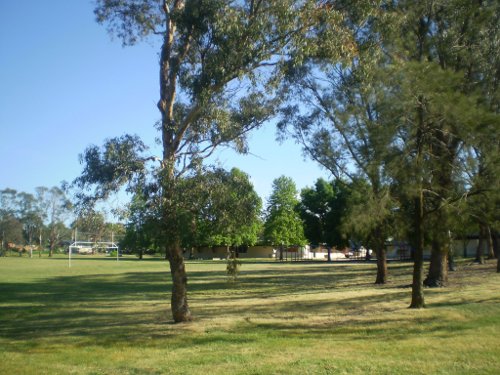The motion to re-open four schools — Flynn, Hall, Cook and Tharwa primary schools — was put to the Assembly today by the Canberra Liberals, but there was no vote.
Labor’s Andrew Barr opposed the motion. The Greens Meredith Hunter gave no speech, moving instead to adjourn debate to another day.
Hansard transcript
Taken from the Assembly website at: http://www.hansard.act.gov.au/hansard/2009/week12/4397.htm
MR DOSZPOT (Brindabella) (10.02): I move:
That this Assembly:
(1) notes:
(a) recommendation 13 of the Standing Committee on Education, Training and Youth Affairs inquiry into school closures and reform of the ACT education system, which states that based on the demographic, educational, social and economic evidence presented during the inquiry, that the Government immediately commences the process to reopen the Hall and Tharwa primary schools; and
(b) the demographic, educational, social and economic evidence that supports the reopening of Flynn and Cook primary schools; and
(2) calls on the ACT Government to immediately commence the process to reopen Hall, Tharwa, Flynn and Cook primary schools.
The motion that the opposition have brought to this place is one that the communities of Tharwa, Hall, Flynn and Cook have been working towards and waiting for since that fateful decision was made by the Stanhope government, for reasons known only really by them, to close these and 19 other schools in 2006.
In the process, hundreds of families had their lives disrupted by the closure of their neighbourhood school, incurred increased travel costs, and faced increased safety risks for their children travelling to and from more distant schools. In the main, parents in these communities had to bear the impact of this folly of Minister Barr. All this was done on, once again, a serious misrepresentation of facts by the minister for education using unsubstantiated assertions that small schools offer a lesser education, contrary to research evidence, and that they are too expensive.
This is a motion that reflects the Canberra Liberals’ commitment to these communities and an attempt to fulfil the election promise that we made to reopen the Tharwa, Hall, Flynn and Cook schools going into the last election. This motion also reflects what many in the community understood was the sentiment of the ACT Greens, who took a similar promise to the 2008 election. The ACT Greens, in their election material in the lead-up to the election, said:
- The ACT Greens will review and reassess all school and preschool closures …
We can consider that the inquiry into school closures conducted by the Standing Committee on Education, Training and Youth Affairs was a review and the information provided through this process was certainly enough to reassess, so the question is: why are our colleagues stopping short of implementing the result of all of this? The clear evidence that we are left with leaves us with the pure and simple fact that these schools can be and should be reopened.
We, the opposition, have always been available to discuss any issue along these lines, and we would certainly ask our Greens colleagues to pursue this matter and this motion and support us today. The reality of the situation is that the more delays that are put in place the harder it is going to be for these communities to get the results that they are so desperately seeking.
Minister Barr has already stated when the recommendations were received that he will not reopen any schools, so any more stalling for time is simply that—stalling for time for no apparent good reason. Mr Brendan Morling, Secretary of the Cook P&C Association, said during his appearance on 1 May at the public hearing into the school closures:
In summary, the Cook community was dealt with in a disrespectful and misleading manner that has continued with the government’s submission to this inquiry. I note that the Greens member for Ginninderra, Meredith Hunter, put out a press release on 24 September 2008 noting that the ACT Greens will review and reassess all school and preschool closures using criteria that included community impact, climate change impact and parent attitudes.
Clearly, in our view, any proper assessment of Cook Primary and Pre-school against these criteria would lead to a decision to reopen the Cook schools. We will be watching this process keenly to see if the ACT Greens are indeed serious about education outcomes.
I think that there will be many in the community who will be watching keenly and reflecting on the commitments that have been made by both the Liberals and the ACT Greens. Much debate in the community and within these walls has ensued in the three years since the closures which have culminated in the findings of the inquiry into school closures tabled in this place recently.
One of the key findings, as detailed in the motion, states that based on the demographic, educational, social and educational evidence presented during the inquiry, the government commence the process to reopen Hall and Tharwa schools. This finding was further enhanced in a statement made by my colleague Mr Hanson in the report, which stated that the evidence was also there to commence the reopening of Flynn and Cook schools as well.
The purpose of this motion today is to look to the future and learn from the past. One of the biggest hurdles that confront this government is their inability to acknowledge that they have made a mistake. It happens in society in general—mistakes are made, and once they are acknowledged they can be rectified. This, however, does not seem to be the case with this Labor government, and in particular with Minister Barr.
Today is an opportunity for this government to do something for the communities they have so badly failed and misled. Today is an opportunity for the government to at least acknowledge that the process was not complete and that they will not undertake to make such wholesale changes to the education system on that scale again.
Today this government have an opportunity to say that they are sorry for the pain and the suffering experienced by these communities and that they acknowledge that there is a case to reopen Tharwa, Flynn, Cook and Flynn primary schools because without doing this and without the ability to acknowledge their wrongdoing in the very first place they will be forever unable to move forward with the complete trust of the ACT community.
Let us now have a look at some of the evidence of misrepresentation which has been so rudely dismissed out of hand by this government and add a couple of other factors for good measure. During the inquiry, witnesses meticulously recounted the flaws in the government’s process and highlighted the injustices that were meted out to certain communities. We heard about the perceived conflict of interest and off-the-record promises made by staff members of ministers of this government.
We heard the sorry tale of the staffer from Mr Stanhope’s office at the time, who obviously relayed the details of a confidential discussion with the Tharwa community, which essentially led to the last-minute changes to the Education Act, preventing the Tharwa community from activating their plan B—which was to open a community school.
There is also the matter of a conflict of interest in the Chief Minister’s office, which was brought to light in documents obtained under FOI and reiterated in the inquiry. There is a perception amongst the community that this conflict of interest had influence and played a part in closing the viable Flynn primary school in preference to a school with smaller enrolments where this employee of the Chief Minister was involved as a parent.
The confidence of this community was betrayed in the most underhanded way. It seems that once the government got wind that the community were not going to allow their schools to close without a fight they did what they do best—they got down and dirty and showed disregard for the due process that these decisions deserved.
The school closures inquiry report delivered many damning findings that highlighted how the minister for education at the time, Mr Barr, proceeded to close schools for no sound reasons, based on flawed data, with invalid information on school size and school performance and with no social impact study whatsoever.
The misrepresentation of significant evidence that suggested that small schools were viable, namely Professor Caldwell’s report, is another failure on this government’s behalf. Professor Caldwell’s research was clearly misrepresented and skewed to suit the purpose of the government. The education committee agreed that the research findings of Professor Brian Caldwell were misused and should not have been used at all to justify school closures. The minister was also given a gentle slap on the wrist by Professor Caldwell himself in a letter to the committee.
In each formal notice of decision to close 11 primary schools in 2006 the research of Professor Caldwell was cited to justify closing the school because it had fewer than 300 to 400 students. The notices stated that the school concerned was too small, based on Professor Caldwell’s research, and was more than likely unable to provide an adequate education because of its size. However this contradicts the professor, and the committee’s report at page 47 cites the professor as follows:
There is to my knowledge no evidence to support a conclusion that primary schools of less than 300—400 students are necessarily less educationally effective because of their size.
On pages 46 and 47 the professor is quoted as saying:
- … research has repeatedly found small schools to be superior to large schools on most measures and equal to them on the rest.
The committee’s report goes on at page 47 to conclude:
- The committee has concluded that Professor Caldwell’s research had been used to support a particular policy conclusion when it supports the provision of quality education services in school settings of various sizes including in small schools. The committee also observed that this interpretation had been used to support a decision-making process without significant contact or verification of the interpretation from the author.
This is completely misleading. If this part of the evidence used to close schools was misrepresented, how on earth can we trust the rest of the so-called evidence? The community was, quite rightly, incensed by these revelations of the minister’s misrepresentations, and the community as represented by the Save Our Schools Committee called on the minister for education to resign. I quote from the media release dated 20 September 2009:
Save Our Schools today called on the ACT Minister for Education, Andrew Barr, to resign because he misused research evidence in his decisions to close schools.
SOS Convenor, Trevor Cobbold, said that the Legislative Assembly should pass a no confidence motion in the Minister if he fails to tender his resignation.
Mr Cobbold is quoted as saying:
- The minister has no choice but to resign following the Assembly report on school closures which shows that he misused research in his decision to close small schools.
The minister has been indicted by the Education Committee of the Legislative Assembly for wrongly using the research findings of Professor Brian Caldwell on small schools to justify school closures. He has been repudiated by the Professor himself. He has been effectively condemned by his own Labor colleagues on the Education Committee.
Mr Cobbold’s press release goes on for quite a few paragraphs, and I will not read all of them into the debate today. In the Towards 2020 documents, statements of education performance based upon student testing data were included contrary to protocols for their use, although it must be noted that they were later removed from the public website.
In 2006, the Chief Minister denied that student outcomes performance based upon testing data—ACTAP—was used in deciding which schools to close, but Minister Barr confessed at the inquiry this year that it was in fact the determining factor in whether or not a school closed.
Hundreds of pages of documents and the Costello functional review have been withheld from the public for three years now; another clear example of the disdain and contempt paid to the community by the minister for education, Andrew Barr. New members of this government, and I am of course referring to Ms Burch in this instance, have especially failed to address their predecessor’s mistake. Let us hope this is not the case when Ms Burch takes over her ministerial portfolios.
Instead of standing up for the communities she represents, we have Ms Burch referring to schools such as Hall and Tharwa as boutique schools, as if they were a luxury not a necessity. I would like to suggest that Ms Burch take a drive down to Tharwa. I hazard a guess she may receive a fairly cold welcome similar to that of Mr Hargreaves; nevertheless it would be worth while for her to see for herself what has happened to that community over the past three years without their community and social hub, a primary school.
Looking to the future, these schools highlighted in the opposition’s motion today can and should be reopened. The case has been made and the communities are willing and able to ensure that this happens. They will look to the future with a renewed sense of hope as a result of the decisions made here today. We must pay credit to the devotion and diligence with which these communities actively fought for their schools, and that continues to this day.
The Hall P&C Secretary, Maryann Harris, said during the public hearing:
- I feel quite sure that parents of younger children, particularly parents who have children who may have not yet started school, will be very keen to return to Hall. Also, new parents, parents whose children either are disaffected in the super schools of Gungahlin or have moved into the area recently or their children are just growing up and are ready to start school soon will all be available to come back to Hall. It had an excellent reputation at the time. It met the needs of people looking for that sort of school. Those people still exist.
Roger Nicoll, from the Flynn Community Group, also said at the public hearing:
- A safe, locally accessible school and early childhood and intergenerational community hub will produce the optimum long-term effects and flexibility for the ACT government and the community. The annual benefits will outweigh any short-term gain from selling off the land for housing. This will be most obvious in terms of the improved social capital in a suburb, as we said before, withoutany other social infrastructure—no shops, no schools, no churches. Through early intervention and improved social inclusion, the hub would reduce the burden of government costs in the areas of health, welfare, crime prevention and rehabilitation.
In conclusion, I urge my colleagues to support this motion. The Greens cannot honestly sit back and wait for three months for a government response to the inquiry. They know what the government will say. They know in their heart of hearts that Mr Barr will not back down, and will not ever admit he was wrong. He has not done this yet and I fear he will never yield to the overwhelming evidence before him.
The power to do the right thing is completely in the hands of the ACT Greens, and I urge them again to follow through on their commitment to the communities of Hall, Tharwa, Flynn and Cook and vote with us on this motion. There is a line in the sand now and it is up to them to cross it.
MR BARR (Molonglo—Minister for Education and Training, Minister for Children and Young People, Minister for Planning and Minister for Tourism, Sport and Recreation) (10.17): The government will not be supporting this motion. It is a cynical political stunt. We will respond to the committee report in due course, as I have indicated to the Assembly previously.
In closing, can I again reiterate the government’s position that not one cent will be taken from any other ACT school to fund recommendations contained within that committee report. We will not be ripping capital away from any of the programs and projects that are underway in ACT public schools at this point in time, so all school communities can be assured that their present levels of funding for their present capital works programs and their present resources as allocated by the Department of Education and Training will remain entirely unaffected by any recommendations of the committee. The government will not be supporting this motion.
Motion (by Ms Hunter) put: That the debate be adjourned. … Question so resolved in the affirmative.
Mr Seselja: Mr Speaker, am I able to move now that this be listed for debate at a later hour this day?
MR SPEAKER: That is the question I was just about to put. Is it the wish of the Assembly to adjourn this matter to a later hour this day, or a later day? Mr Barr, what is your position? A later day?
Mr Barr: Not today, no. I mean, whatever the Greens—
Members interjecting—
MR SPEAKER: Order, members! I am going to put the question that the matter be made an order of the day for a later day. That appears to be the will of the Assembly.
Question put: That the resumption of the debate be made an order of the day for the next sitting.
The Assembly voted—Question so resolved in the affirmative.



